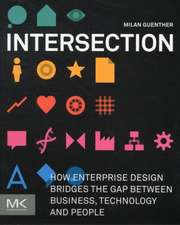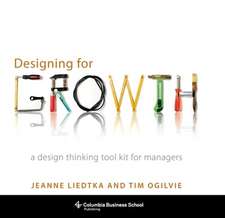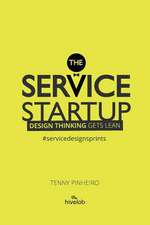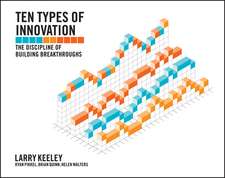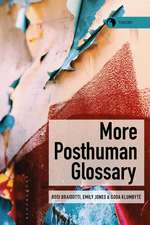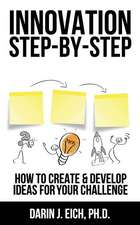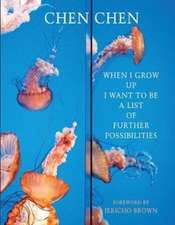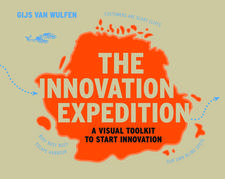101 Design Methods: A Structured Approach for Driving Innovation in Your Organization
Autor V Kumaren Limba Engleză Paperback – 22 oct 2012
The first step-by-step guidebook for successful innovation planning Unlike other books on the subject, 101 Design Methods approaches the practice of creating new products, services, and customer experiences as a science, rather than an art, providing a practical set of collaborative tools and methods for planning and defining successful new offerings. Strategists, managers, designers, and researchers who undertake the challenge of innovation, despite a lack of established procedures and a high risk of failure, will find this an invaluable resource. Novices can learn from it; managers can plan with it; and practitioners of innovation can improve the quality of their work by referring to it.
Preț: 203.61 lei
Nou
38.97€ • 42.35$ • 32.76£
Carte disponibilă
Livrare economică 01-15 aprilie
Livrare express 15-21 martie pentru 41.04 lei
Specificații
ISBN-10: 1118083466
Pagini: 336
Ilustrații: Illustrations
Dimensiuni: 188 x 239 x 18 mm
Greutate: 0.71 kg
Editura: Wiley
Locul publicării:Hoboken, United States
Public țintă
Designers, marketers, product managers, c–level executives, (including chief design officers and chief innovation officers), corporate trainers; professionals and students including design, business, engineering, and medical; anyone who wants to increase their ability to apply innovation to their business or organization.Cuprins
Introduction Four core principles of successful innovation Principle 1: Chapter 2: Build Innovations around Experiences Nike Principle 2: Chapter 4: Think of Innovations as Systems Healthcare system Principle 3: Chapter 3: Cultivate an Innovation Culture Innovation culture in organizations Principle 4: Adopt a Disciplined Innovation Planning Process Integrating innovation processes A model of the design innovation process The Design Innovation Process with seven distinct modes of activity Process is non-linear Process is iterative Seven modes of the design innovation process Mode 1: Sense Intent Mode 2: Know Context Mode 3: Know People Mode 4: Frame Insights Mode 5: Explore Concepts Mode 6: Frame Solutions Mode 7: Realize Offerings Understanding methods Mode 1: Sense Intent Sense Intent: Mindset Mindset: Sensing changing conditions Mindset: Seeing Overviews Mindset: Foreseeing trends Mindset: Reframing problems Mindset: Forming an intent Sense Intent: Methods 1.01 Buzz Reports 1.02 Popular Media Scan 1.03 Key Facts 1.04 Innovation Source Book 1.05 Trends Expert Interview 1.06 Keyword Bibliometrics 1.07 Ten Types of Innovation Framework 1.08 Innovation Landscape 1.09 Trends Matrix 1.10 Convergence Map 1.11 From . . . To Exploration 1.12 Initial Opportunity Map 1.13 Offering-Activity-Culture Map 1.14 Intent Statement Mode 2: Know Context Know Context: Mindset Mindset: Knowing Context History Mindset: Understanding Frontiers Mindset: Seeing System Overviews Mindset: Understanding Stakeholders Mindset: Using Mental Models Know Context: Methods 2.01 Contextual Research Plan 2.02 Popular Media Search 2.03 Publications Research 2.04 Eras Map 2.05 Innovation Evolution Map 2.06 Financial Profile 2.07 Analogous Models 2.08 Competitors-Complementors Map 2.09 Ten Types of Innovation Diagnostics 2.10 Industry Diagnostics 2.11 SWOT Analysis 2.12 Subject Matter Experts Interview 2.13 Interest Groups Discussion Mode 3: Know People Know People: Mindset Mindset: Observing Everything Mindset: Building empathy Mindset: Immersing in daily life Mindset: Listening openly Mindset: Looking for problems and needs Know People: Methods 3.01 Research Participant Map 3.02 Research Planning Survey 3.03 User Research Plan 3.04 Five Human Factors 3.05 P.O.E.M.S. 3.06 Field Visit 3.07 Video Ethnography 3.08 Ethnographic Interview 3.09 User Pictures Interview 3.10 Cultural Artifact 3.11 Image Sorting 3.12 Experience Simulation 3.13 Field activity 3.14 Remote Research 3.15 User Observations Database Mode 4: Frame Insights Frame Insights: Mindsets Mindset 1: Exploring Systems Mindset 2: Looking for Patterns Mindset 3: Constructing Overviews Mindset 4: Identifying Opportunities Mindset 5: Developing Guiding Principles Frame Insights: Methods 4.01 Observations to Insights 4.02 Insights Sorting 4.03 Observation Queries 4.04 User Response Analysis 4.05 ERAF Systems Diagram 4.06 Descriptive Value Web 4.07 Entities Position Map 4.08 Venn Diagram 4.09 Tree / Semi-lattice Diagram 4.10 Symmetric Clustering Matrix 4.11 Asymmetric Clustering Matrix 4.12 Activity Network 4.13 Insights Clustering Matrix 4.14 Semantic Profile 4.15 User Groups Definition 4.16 Compelling Experience Map 4.17 User Journey Map 4.18 Summary Framework 4.19 Design principles generation 4.20 Analysis Workshop Mode 5: Explore Concepts Explore Concepts: Mindset Mindset 1: Challenging assumptions Mindset 2: Standing in the future Mindset 3: Exploring concepts at the fringes Mindset 4: Seeking clearly added value Mindset 5: Narrating stories about the future Explore Concepts: Methods 5.01 Principles to Opportunities 5.02 Opportunity Mind Map 5.03 Value Hypothesis 5.04 Persona Definition 5.05 Ideation Session 5.06 Concept Generating Matrix 5.07 Concept Metaphors and Analogies 5.08 Role-play Ideation 5.09 Ideation Game 5.10 Puppet Scenario 5.11 Behavioral Prototype 5.12 Concept Prototype 5.13 Concept Sketch 5.14 Concept Scenarios 5.15 Concept Sorting 5.16 Concept Grouping Matrix 5.17 Concept Catalog Mode 6: Frame Solutions Frame Solutions: Mindset Mindset: Conceiving Holistic Solutions Mindset: Conceiving Options Mindset: Making Value Judgments Mindset: Envisioning Scenarios Mindset: Structuring Solutions Frame Solutions: Methods 6.01: Morphological Synthesis 6.02: Strategy Table 6.03: Concept Evaluation 6.04: Prescriptive Value Web 6.05: Concept Linking Map 6.06: Foresight Scenario 6.07: Solution Diagram 6.08: Solution Storyboard 6.09: Solution Enactment 6.10: Solution Prototype 6.11: Solution Evaluation 6.12: Solution Roadmap 6.13: Solution Database 6.14: Synthesis Workshop Mode 7: Realize Offerings Realize Offerings: Mindset Mindset 1: Reiterating Prototypes Mindset 2: Evaluating in Reality Mindset 3: Defining Strategies Mindset 4: Implementing in Reality Mindset 5: Communicating Vision Realize Offerings: Methods 7.01 Strategy Roadmap 7.02 Platform Plan 7.03 Strategy Plan Workshop 7.04 Pilot Development and Testing 7.05 Implementation Issues Matrix 7.06 Competencies Plan 7.07 Team Formation Plan 7.08 Vision Statement 7.09 Innovation Brief

